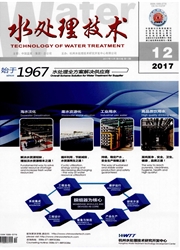

 中文摘要:
中文摘要:
对比考察了沸石和陶粒填料曝气生物滤池(BAF)处理微污染水源水的低温启动特性和污染物去除效能。结果表明,在水温为10-14℃的启动条件下,沸石和陶粒BAF对NH3-N和有机物的去除能力几乎同步形成,均可在30d内完成接种挂膜,生物相丰富;BAF的污染物去除效能随温度下降有所降低,但仍能维持较好的NH3-N和CODMn去除能力,在2~7℃的低温运行条件下,沸石和陶粒BAF对NH3-N的平均去除率分别为86.54%和84.45%,对CODMn的平均去除率分别为17.28%和16.22%;低温对BAF复杂有机物(UV254)和浊度去除效能的影响比较显著,沸石BAF的除污染物效能略优于陶粒BAF。
 英文摘要:
英文摘要:
The investigation of startup characteristics and treatment efficiency of biological aerated filter (BAF) for micro-polluted source water treatment in low temperature were carded out in two pilot scale filters with zeolite and ceramsite media, respectively. The results showed that the zeolite and ceramsite media BAFs could be operated successfully in 30 d as well as the promising treatment performance of organic removal and ammonia nitrogen removal would be almost synchronous accomplished. It was observed that the pollutants removal efficiency of the two BAFs declined with the temperature decreasing, but the required removal rate of permanganate index and ammonia nitrogen could be still guaranteed. The average removal rate of ammonia nitrogen in zeolite and ceramsite media BAFs were 86.54% and 84.45% respectively, and the average removal rate of permanganate index were 17.28% and 16.22% respectively. The UV254 and turbidity removal ability of two BAFs seemed more sensitive to the temperature decreasing, as well as the zeolite BAF performed a better treatment performance than ceramsite BAF.
 同期刊论文项目
同期刊论文项目
 同项目期刊论文
同项目期刊论文
 期刊信息
期刊信息
